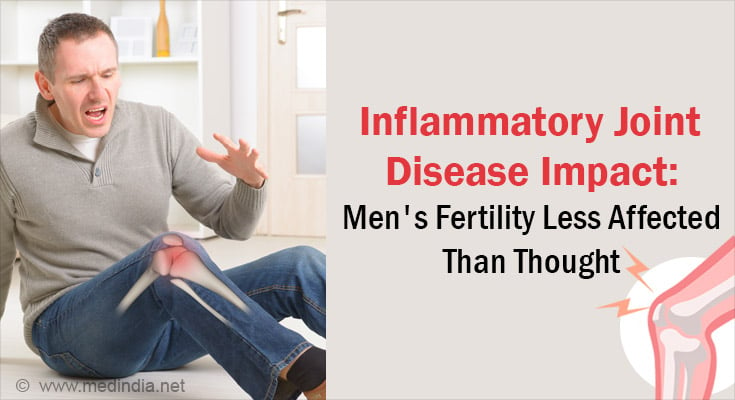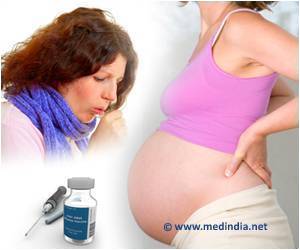- Inflammatory joint diseases have traditionally been associated with male infertility
- Contrary to previous beliefs, a recent study suggests men with these conditions are less likely to be childless and tend to have more children
- These contrasting results offer reassurance to male patients and emphasize the need for tailored treatment strategies
The impact of inflammatory joint diseases on various aspects of health is well documented, and their potential association with male infertility has been a topic of interest and concern. However, emerging evidence suggests that the impact of inflammatory joint diseases on male fertility may not be as straightforward as initially thought, suggesting a limited or negligible effect.
Recent research published in the Annals of Rheumatic Diseases suggests that men with inflammatory joint diseases, such as arthritis, are less likely to be childless and tend to have more children compared to their healthy counterparts (1✔ ✔Trusted Source
Male patients with inflammatory joint diseases are less likely than controls to be childless: results from a Norwegian population-based cohort study of 10 865 patients
).
Advertisement
Complex Interplay of Inflammatory Joint Disease in Male Infertility
Inflammatory joint diseases, encompassing a diverse group of conditions such as rheumatoid arthritis, ankylosing spondylitis, and psoriatic arthritis, are characterized by chronic inflammation affecting the joints and other tissues. These conditions often pose a myriad of challenges to those affected, ranging from pain and stiffness to potential joint damage.
Male infertility is a complex issue influenced by various factors, including genetic, hormonal, environmental, and lifestyle factors.
Studies have shed light on the potential consequences for men diagnosed with inflammatory joint diseases facing lower fertility rates, higher childlessness rates, and more fertility problems. Chronic inflammation, altered hormonal profiles, and immune system dysregulation are among the factors believed to contribute to the observed reproductive challenges in men with these conditions (2✔ ✔Trusted Source
Impaired fertility in men diagnosed with inflammatory arthritis: results of a large multicentre study (iFAME-Fertility)
Advertisement
Fertility Patterns in Men with Inflammatory Joint Diseases
The interplay between inflammatory joint diseases and male reproductive health has prompted a scientific inquiry into whether these conditions may have implications for fertility in men.
The study, using childlessness and the number of children as indicators of fertility, involved 10,865 Norwegian men with rheumatoid arthritis (37%), psoriatic arthritis (33%), or spondyloarthritis (30%), each matched with 5 healthy men (54,325) from the general population.
The study, spanning from 1967 to August 2021, included 111,246 children born to a total of 65,190 men. The average age of first-time fatherhood was 27 for men with inflammatory joint disease and 28 for the comparison group. The average age at diagnosis was 44.
The researchers divided the births and childlessness into three time periods, reflecting changes in drug treatment for inflammatory joint diseases: 1967-85 (before methotrexate; 575); 1986–99 (methotrexate; 1360); and 2000–21 (biologics; 8930).
The findings showed that the average number of children per patient was 1.8 compared to 1.7 in the comparison group, with 21% of patients being childless compared to 27% in the comparison group. The difference in childlessness and the number of children was consistent across age brackets, except for those aged 19 and younger. Notably, men diagnosed after 2000 had the highest difference in the number of children (average of 1.8 vs. 1.6) and the lowest risk of childlessness (22% vs. 28%).
Read More to Know About ‘Inflammatory Arthritis During Reproductive Age Could Impair Male Fertility’
Advertisement
Limitations of the Study
The researchers emphasized that this is an observational study, and no firm conclusions can be drawn about the cause. Other factors, such as psychological and socioeconomic aspects, employment status, and smoking, could also influence fertility, but these were not evaluated in the study.
The results suggest that male patients with inflammatory joint disease may be reassured about fertility, but more targeted investigations based on specific diagnoses are needed to provide more detailed information. They also highlight the need for further research to explore associations between fertility, inflammatory rheumatic diseases, and immune-modulating drugs.
In conclusion, contrary to initial concerns, men with inflammatory joint diseases are less likely to be childless and tend to have more children compared to their healthy counterparts. While the results may offer reassurance to male patients with inflammatory joint diseases regarding fertility, there is also a need for further research in this evolving field.
References:
- Male patients with inflammatory joint diseases are less likely than controls to be childless: results from a Norwegian population-based cohort study of 10 865 patients – (http://press.psprings.co.uk/ard/january/ard224998.pdf)
- Impaired fertility in men diagnosed with inflammatory arthritis: results of a large multicentre study (iFAME-Fertility) – (https://www.ncbi.nlm.nih.gov/pmc/articles/PMC8600610/)
Source-Medindia



